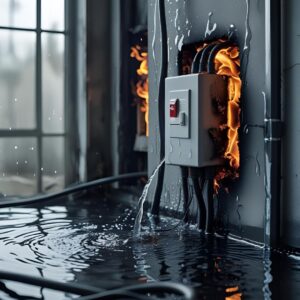People often regard water leaks as insignificant household problems, yet they can cause much more serious repercussions than expected. Water leaks pose a significant danger because they can ignite electrical fires. Can a water leak cause an electrical fire? The outcomes are disastrous when water comes into contact with electrical systems.
This article explores how water leaks can lead to electrical fires and answers the question, “Can a water leak cause an electrical fire?” It also highlights the warning signs and the steps you can take to safeguard your home. Ultimately, you will gain valuable information to protect your home and family.

How Can a Water Leak Cause an Electrical Fire?
To understand how water leaks lead to electrical fires, it’s important first to grasp how water and electricity interact.
Water as a Conductor of Electricity
Water, particularly when it has impurities or minerals, is a superb conductor of electricity. A water leak interacting with electrical wiring interrupts the usual flow of electricity. This can cause short circuits, overheating, or sparks, all of which might trigger fires.
Common Scenarios That Lead to Electrical Fires
In scenarios like these, water leaks and electricity frequently intersect:
- Leaking Roofs: Roof damage can allow water to seep into walls or attics where wires may be exposed. Prolonged contact with water can create short circuits or spark fires.
- Burst Pipes Near Electrical Systems: A burst pipe can release water near outlets, appliances, or other wiring, posing immediate hazards.
- Hidden Plumbing Leaks: Leaks behind walls where hidden electrical wiring exists are especially hazardous since they often go unnoticed until considerable damage has happened.
These situations emphasize the riskiness of combining water leaks with electrical systems. Timely identification and prompt response are crucial.
Signs of a Water Leak Near Electrical Systems
Spotting the warning signs of a leak near electrical systems can prevent serious damage. Here are some of the key indicators:
1. Visible Water Damage
Inspect for stains, moisture marks, or color variations on walls, ceilings, or floors near electrical components such as outlets and switches. These indicators frequently signify water entry.
2. Flickering Lights
If your lights flicker, dim, or act unpredictably, this might indicate water impacting the electrical wiring.
3. Burning Smell or Smoke
An unidentified burning odor or the appearance of smoke around electrical parts is a definite indicator of overheating or possible fires. Shut off the electricity right away if you see this.
4. Tripped Circuit Breakers
Regular tripping of your circuit breaker may suggest that water has entered your electrical system and is leading to disturbances.
5. Unusual Sounds
Hissing, popping, or crackling sounds near outlets or devices usually indicate that moisture is affecting electrical wires, resulting in dangerous situations.
If you notice any of these signs, it’s crucial to act quickly to minimize the risk.
Immediate Steps to Take If You Suspect a Water Leak Near Electrical Systems
If you think water and electricity are combining in your house, stay calm. Adhere to these steps to guarantee safety:
1. Turn Off the Electricity
Head to your home’s electrical panel and switch off the power to the affected areas. This will eliminate the risk of shock or fire.
2. Avoid Touching Wet Electrical Components
Do not handle wet outlets, switches, or appliances, even if the power is off. Water can still conduct residual electricity.
3. Call Licensed Professionals
Contact a licensed electrician and plumber immediately for inspection and repairs. DIY fixes are dangerous and may worsen the situation.
4. Document the Damage
Capture images of any apparent water or electrical harm. These documents will assist with insurance claims or when seeking advice from experts.
Prompt and careful measures can significantly impact in averting additional harm or risk.
Preventative Measures to Avoid Water Leaks and Electrical Fires
A small effort to prevent problems is more valuable than a large effort to fix them. Adhere to these safety practices to safeguard your residence:
Regular Inspections
- Schedule annual check-ups for your plumbing and electrical systems.
- Repair frayed wiring, old pipes, or minor concerns before they develop into bigger issues.
Install GFCI Outlets
Install GFCI outlets in areas with high moisture such as bathrooms, kitchens, laundry rooms, and basements. These outlets automatically shut off power when a fault occurs, minimizing the risk of electric shock and fires.
Seal Potential Leak Sources
Ensure that windows, roofs, and pipe entry points are properly sealed to prevent water intrusion during heavy rains or plumbing malfunctions.
Schedule Routine Maintenance
Employ experts for regular upkeep and evaluation of your household systems. They are capable of identifying concealed leaks or electrical weaknesses before they escalate into significant problems.
Implementing preventive actions can both reduce repair costs and guarantee your home’s safety.
When to Call a Professional
Certain situations demand the expertise of licensed electricians and plumbers. Here’s when you should lean on the pros:
Critical Scenarios to Avoid DIY Fixes
- Ongoing Water Exposure: Always consult professionals if water gathers around electrical systems.
- Repeated Circuit Breaker Trips: This signals a serious electrical issue that requires immediate attention from an expert.
- Hidden Damage: If the water or electrical damage is behind walls or ceilings, it’s best to leave the assessment to professionals.
Employing experts guarantees that potential risks are effectively managed and safety is reinstated.
Safeguard Your Home from Water and Electrical Hazards
Do not overlook the problems of water leaks and electrical fires. By understanding the dangers and recognizing the indicators, you can prevent these threats from jeopardizing your home and family.
Remain proactive through consistent inspections, timely identification, and preventive actions such as GFCI outlets and effective sealing. Crucially, recognize when to enlist experts for managing complicated problems.
Safeguard your residence by remaining alert. Taking small actions today can help you avoid the hassle of selling a fire-damaged house in the future.
Previous